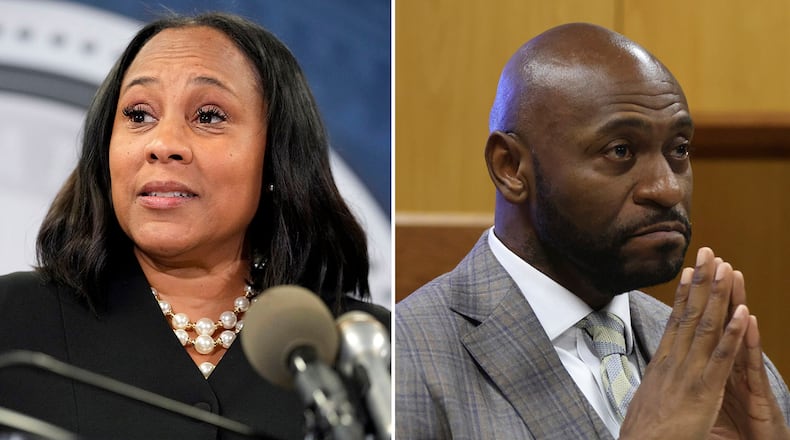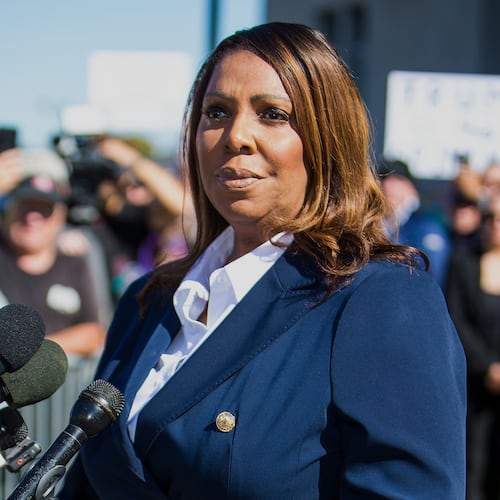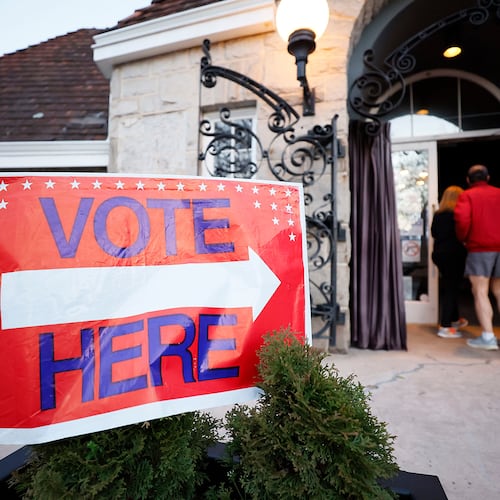Allegations of an “improper, clandestine personal relationship” between District Attorney Fani Willis and Nathan Wade, a private attorney she hired as special prosecutor, roiled Fulton County’s high-profile racketeering case against Donald Trump and his allies. On Tuesday, Georgia’s top court upheld a lower-court ruling saying she and her office should be disqualified from the case.
Here’s a timeline:
Jan. 1, 2021: Willis takes office as Fulton County district attorney after defeating her former boss in the Democratic primary and running unopposed in the November election.
Feb. 10, 2021: In a letter to top Georgia officials, Willis says she’s opened a criminal investigation into interference in the state’s 2020 general election.
Nov. 1, 2021: Willis hires Wade as special prosecutor in the investigation. She offered the job to several other Georgia attorneys, including former Gov. Roy Barnes, but they declined.
May 2, 2022: A special grand jury is impaneled to investigate attempts by former President Donald Trump and his supporters to overturn his loss in Georgia.
Aug. 14, 2023: Trump and 18 supporters are charged in a 41-count indictment alleging they acted as “criminal enterprise” in an attempt to subvert the election results in Georgia.
Jan. 8, 2024: An attorney for defendant Michael Roman files a motion seeking to disqualify the DA’s office from the case because of an alleged romantic relationship between Willis and Wade. The filing says that because Wade paid for trips they took together, Willis benefited financially from the arrangement.
Jan. 14, 2024: Willis delivers a 35-minute speech at the historic Big Bethel AME Church in which she defends Wade as a “great friend” and a “legal superstar” but does not address whether they are romantically involved. She suggests racism is behind the accusations, noting that critics targeted Wade, who is Black, and not the two other special prosecutors on the Trump case, who are white.
Jan. 19, 2024: Attorneys for Wade’s estranged wife, Joycelyn, attach some of his credit card records to a court filing. They confirm that he purchased plane tickets and other expenses for Willis and himself for a trip to Miami in October 2022 and another to San Francisco in April 2023.
Jan. 25, 2024: Former President Donald Trump joins in on Roman’s motion to disqualify Willis. His Atlanta-based attorneys also accuse the DA of trying to “foment racial bias” into the case that could prejudice a jury, citing her comments at Big Bethel AME Church. In the coming weeks, other defendants also join the motion.
Feb. 2, 2024: Willis and Wade acknowledge a “personal” relationship in a court filing. But they deny any improper behavior and say their relationship is not grounds to disqualify them from prosecuting the case.
Feb. 15, 2024: Fulton County Superior Court Judge Scott McAfee convenes an evidentiary hearing. Willis takes the stand and defends herself in emotional and combative testimony. “I’m not on trial, no matter how hard you try to put me on trial,” Willis tells defense attorney Ashleigh Merchant. Wade also testifies. So does Robin Yeartie, an ex-employee of the DA’s office and Willis’ onetime friend. Yeartie contradicts the testimony of Willis and Wade, who each say their romantic relationship began in 2022. Yeartie says it started in 2019.
Feb. 16, 2024: In the hearing’s second day, Willis’ father, John Clifford Floyd III, takes the stand and bolsters key parts of her testimony. Wade’s former law partner, Terrence Bradley, also testifies but is barred by attorney-client privilege from answering many questions.
Feb. 23, 2024: Trump’s lawyers submit cellphone data to the court which purports to shows that in 2021 Wade visited the Hapeville neighborhood where Willis was living nearly three dozen times. In two of those visits, Wade’s cellphone arrives late at night and leaves in the predawn hours. (Both Wade and Willis had testified that they did not spend the night together at the Hapeville condo.) The DA’s office fires back that the records should not be admitted into evidence.
Feb. 27, 2024: Bradley, Wade’s former law partner and divorce attorney, again takes the stand after the judge determines that some things he could say are not shielded by attorney-client privilege. Bradley testifies that he doesn’t know when the relationship between Wade and Willis began, contradicting what he had previously told Merchant.
March 1, 2024: McAfee hears closing arguments. The judge declines to admit additional evidence, such as Wade’s cell phone records.
March 6, 2024: A new state Senate Committee on Investigations begins hearing testimony about Willis and her office. Its first witness is Merchant. The committee, which has subpoena power, was created earlier in the year to investigate Willis.
March 15, 2024: McAfee rules that Willis has a choice: recuse herself and her office from the case or allow Wade to withdraw. McAfee says that while the defense did not prove that an actual conflict of interest existed to disqualify the DA, the appearance of impropriety “infects” the prosecution team. Hours later, Wade resigns.
March 20, 2024: Judge McAfee grants permission for Trump and other defendants to appeal his decision that keeps Willis on the case.
May 8, 2024: The Georgia Court of Appeals agrees to consider whether McAfee was right in allowing Willis to remain on the case. The decision means a significant delay in the election interference case going to trial.
Nov. 5, 2024: Trump is reelected to a second term, casting doubt on the future of the Fulton County prosecution. Willis is also reelected to a second term easily defeating Republican Courtney Kramer.
Dec. 19, 2024: In a 2-1 decision the court rules that Willis and her office should be disqualified from the case. Benjamin Land delivers a stinging dissent. Trenton Brown and Todd Markle write for the majority. Willis’ office signals they will appeal to the Georgia Supreme Court.
Sept. 16, 2025: In a 4-3 decision, the Georgia Supreme Court refused to hear Willis’ appeal, meaning the lower court’s ruling stands and Willis is ousted from the case.
About the Author
Keep Reading
The Latest
Featured



